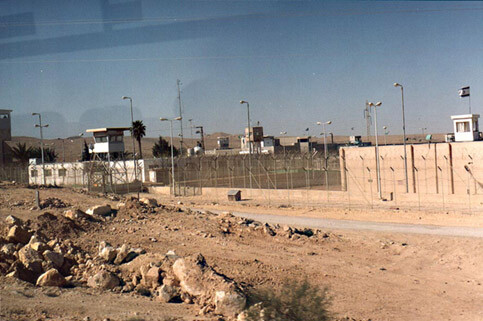The Electronic Intifada 26 August 2004

In Nafha prison (pictured above), prisoners are moved around from one cell to the other every couple of days.
Over 2,000 Palestinian political prisoners are currently participating in a hunger strike to protest their detention conditions and treatment by Israeli prison authorities. These include demands for public phones, the removal of partitions that separate inmates from visiting family members, and a halt to strip searches. They are also demanding the right to be able to hold their children during visits.
The protest is a non-political action aimed at securing conditions consistent with basic standards of humanity for Palestinian prisoners. Since the beginning of the current Intifada Israeli prison authorities have implemented a number of policies that violate basic standards for the treatment of prisoners.
Israeli prison authorities have resorted to new measures to end the open hunger strike that entered its 11th day today. Lawyers of the Palestinian Prisoners Society reported, after calling on a number of strikers in Hadarim, Bir Sheva, and Eilon prisons, that Israeli authorities were deliberately creating confusion among prisoners through constant movement of a big number of inmates from one ward to another and from prison to another.
Israeli authorities transferred leaders of the prisoners’ movement to other prisons or placed them in solitary confinement. Tawfiq Abu Naim, the prisoners’ representative of Nafha prison was transferred to the solitary confinement section of Bir As-Sabaa detention center and Naser Abu Rajab was moved from Shattah to Gilbo. In Nafha prison, prisoners are moved around from one cell to another every couple of days. In the same prison, an Israeli special unit called “Nahson” raids prison cells on a daily basis in order to increase psychological pressure on the prisoners. Seventy prisoners were transferred from Asqalan prison to Nafha.
As a new kind of punitive measure, Israeli authorities have confiscated family photos of prisoners and introduced criminal convicts into the wards of the prisoners on hunger strike, the lawyers reported.
They also refused to extend any medical assistance to needy prisoners unless they ate first, the lawyers said, adding that there were reports that prison authorities forcibly stripped captives, threw their clothes away, then compelled prisoners to run naked after their clothes. Prisoners in Ayalon prison have said that an Israeli high ranking officer visited their ward and stated that the “war waged on Palestinian prisoners is part and parcel of the war waged on the Palestinian people”.
Prisoners reported the use of coercive measures by Israeli authorities against hunger strikers, including threats, and psychological and physical pressures such as beatings. Israeli guards often raid prison cells and force prisoners to strip naked. Israeli guards have confiscated salt, cigarettes, books, and stationary, as well as fans, which has caused breathing difficulties in the stuffy cells, especially among those in solitary confinement.
Prisoners have been refused medical aid. Israeli authorities refuse to transfer any prisoners to hospitals outside the prison walls. Ibrahim Njas from Ramallah who is being held in solitary confinement at Ramle prison was denied medical aid. Israeli prison guards refused to tranfer him even to a clinic inside the prison. Some medical staff at Israeli prisons have tried to blackmail Palestinian prisoners by offering medical aid and medication on the condition that they break their hunger strike.
The Palestinian Prisoners Society has addressed an urgent appeal to the World Health Organization to immediately intervene and investigate the cruel treatment of those prisoners at the hands of Israeli medical staff. The statement charged the doctors of conspiring with the prison authorities to break the strike, through bargaining with the sick prisoner to end their strike in return for supplying them with medication.
Related Links


